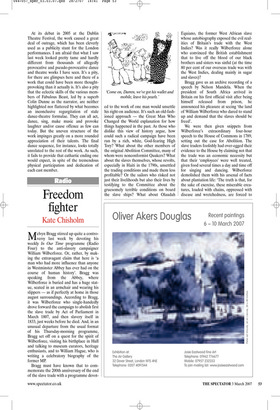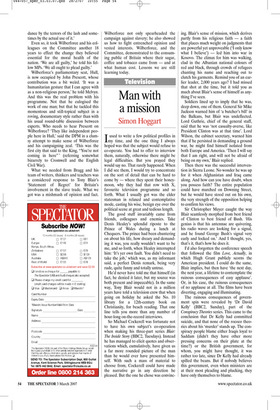Freedom fighter
Kate Chisholm
Melvyn Bragg stirred up quite a controversy last week by devoting his weekly In Our Time programme (Radio Four) to the anti-slavery campaigner William Wilberforce. Or, rather, by making the extravagant claim that here is ‘a man who had more influence than anyone in Westminster Abbey has ever had on the course of human history’. Bragg was speaking from the Abbey, where Wilberforce is buried and has a huge statue, seated in an armchair and wearing his slippers — as if perfectly at home in those august surroundings. According to Bragg, it was Wilberforce who single-handedly drove forward the campaign to abolish first the slave trade by Act of Parliament in March 1807, and then slavery itself in 1833, just weeks before he died. And, in an unusual departure from the usual format of his Thursday-morning programme, Bragg set off on a quest for the spirit of Wilberforce, visiting his birthplace in Hull and talking to museum curators, heritage enthusiasts, and to William Hague, who is writing a celebratory biography of the former MP.
Bragg must have known that to commemorate the 200th anniversary of the end of the slave trade with a programme devot ed to the work of one man would unsettle his right-on audience. It’s such an old-fashioned approach — the Great Man Who Changed the World explanation for how things happened in the past. As those who dislike this view of history argue, how could such a radical campaign have been run by a rich, white, God-fearing High Tory? What about the other members of the original Abolition Committee, many of whom were nonconformist Quakers? What about the slaves themselves, whose revolts, especially in Haiti in the 1790s, unsettled the trading conditions and made them less profitable? Or the sailors who risked not just their livelihoods but also their lives by testifying to the Committee about the gruesomely terrible conditions on board the slave ships? What about Olaudah Equiano, the former West African slave whose autobiography exposed the evil realities of Britain’s trade with the West Indies? Was it really Wilberforce alone who convinced the British establishment that to live off the blood of our black brothers and sisters was sinful (at the time 80 per cent of our overseas trade was with the West Indies, dealing mainly in sugar and slaves)?
Bragg gave us an archive recording of a speech by Nelson Mandela. When the president of South Africa arrived in Britain on his first official visit after being himself released from prison, he announced his pleasure at seeing ‘the land of William Wilberforce who dared to stand up and demand that the slaves should be freed’.
We were then given snippets from Wilberforce’s extraordinary four-hour speech to the House of Commons in 1789, setting out the case for Abolition. The slave traders foolishly had over-egged their evidence to the House by claiming not that the trade was an economic necessity but that their ‘employees’ were well treated, given food several times a day and time off for singing and dancing. Wilberforce demolished them with his arsenal of facts about plantation life: ‘The truth is that, for the sake of exercise, these miserable creatures, loaded with chains, oppressed with disease and wretchedness, are forced to dance by the terrors of the lash and sometimes by the actual use of it.’ Even so, it took Wilberforce and his colleagues on the Committee another 18 years to effect the change they believed essential for the moral health of the nation. ‘We are all guilty,’ he told his fellow MPs. ‘We all ought to plead guilty.’ Wilberforce’s parliamentary seat, Hull, is now occupied by John Prescott, whose contribution was a bit weird. ‘It was a humanitarian gesture that I can agree with as a non-religious person,’ he told Melvyn. And this was the real problem with his programme. Not that he eulogised the work of one man; but that he tackled this momentous and still-topical subject in a roving, documentary style rather than with his usual round-table discussion between experts. Who needs to hear Prescott on Wilberforce? ‘They like independent people here in Hull,’ said the DPM in a clumsy attempt to make sense of Wilberforce and his campaigning zeal. ‘This was the first city that said to the King, “You’re not coming in here” ’ (referring somewhat bizarrely to Cromwell and the English Civil War).
What we needed from Bragg and his team of writers, thinkers and teachers was a considered response to Tony Blair’s ‘Statement of Regret’ for Britain’s involvement in the slave trade. What we got was a mishmash of opinion and fact. Wilberforce not only spearheaded the campaign against slavery; he also showed us how to fight entrenched opinion and vested interests. Wilberforce, and the Committee, demonstrated to the consuming public of Britain where their sugar, coffee and tobacco came from — and at what human cost. Lessons we are still learning today.











































































 Previous page
Previous page